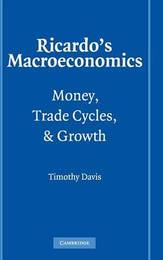
|
Ricardo's Macroeconomics: Money, Trade Cycles, and Growth
Hardback
Main Details
| Title |
Ricardo's Macroeconomics: Money, Trade Cycles, and Growth
|
| Authors and Contributors |
By (author) Timothy Davis
|
| Series | Historical Perspectives on Modern Economics |
|---|
| Physical Properties |
| Format:Hardback | | Pages:330 | | Dimensions(mm): Height 229,Width 152 |
|
| Category/Genre | Macroeconomics |
|---|
| ISBN/Barcode |
9780521844741
|
| Classifications | Dewey:339 |
|---|
| Audience | | Professional & Vocational | |
|---|
|
Publishing Details |
| Publisher |
Cambridge University Press
|
| Imprint |
Cambridge University Press
|
| Publication Date |
2 May 2005 |
| Publication Country |
United Kingdom
|
Description
The outline of modern macroeconomics took shape in Britain in the early nineteenth century thanks, in part, to David Ricardo, one of the most influential economists of the time. Britain was challenged by monetary inflation, industrial unemployment and the loss of jobs abroad. Ricardo pointed the way forward. As a financier and Member of Parliament, he was well versed in politics and commercial affairs. His expertise is shown by the practicality of his proposals, including the resumption of the gold standard, which was essential given the destabilizing policy of the Bank of England. Ricardo's expertise appears also in his debate with T. R. Malthus about whether an industrial economy can suffer a prolonged depression. Say's Law of Markets and the Quantity Theory of Money figure prominently in his works, but not in an extreme form. He was instead a subtle theorist, recognizing the non-neutrality of money, trade depressions and unemployment.
Author Biography
Timothy Davis has a Ph.D. in economics from the University of Toronto and a law degree from Oxford University. He is a practising attorney and a member of the New York State Bar.
Reviews"Davis has done a superb job of combining history of thought and economic history. We should have more studies like it." - Journal of Economic History "Timothy Davis has written a most important book. Any future will need to take Davis's analysis of the important questions into account." - History of Political Economy
|